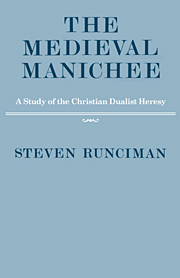Book contents
- Frontmatter
- Contents
- CHAPTER I Introduction
- CHAPTER II The Gnostic Background
- CHAPTER III The Paulicians
- CHAPTER IV The Bogomils
- CHAPTER V The Patarenes
- CHAPTER VI The Cathars
- CHAPTER VII The Dualist Tradition
- APPENDIX I The Greek Sources for Paulician history
- APPENDIX II Heretical Movements in the Eighth Century
- APPENDIX III Various Names given to the Dualist Heretics in Europe
- APPENDIX IV Dualism, Buddhism and Occultism
- BIBLIOGRAPHY
- ADDITIONS (1982)
- INDEX
CHAPTER I - Introduction
- Frontmatter
- Contents
- CHAPTER I Introduction
- CHAPTER II The Gnostic Background
- CHAPTER III The Paulicians
- CHAPTER IV The Bogomils
- CHAPTER V The Patarenes
- CHAPTER VI The Cathars
- CHAPTER VII The Dualist Tradition
- APPENDIX I The Greek Sources for Paulician history
- APPENDIX II Heretical Movements in the Eighth Century
- APPENDIX III Various Names given to the Dualist Heretics in Europe
- APPENDIX IV Dualism, Buddhism and Occultism
- BIBLIOGRAPHY
- ADDITIONS (1982)
- INDEX
Summary
TOLERANCE is a social rather than a religious virtue. A broad-minded view of the private belief of others undoubtedly makes for the happiness of society; but it is an attitude impossible for those whose personal religion is strong. For if we know that we have found the key and guiding principle of Life, we cannot allow our friends to flounder blindly in the darkness. We may recognize that without the key they may yet lead virtuous and admirable lives, but their task is made unnecessarily hard; it is our duty to help them on to the true Path, to show them the light that will illuminate it all. Opinions may vary as to the nature of the help that should be given, whether peaceful persuasion and a shining example, or the sword and the auto da fé. But no really religious man can pass the unbeliever by and do nothing.
Still more than the unbeliever it is the wrong believer, the heretic rather than the infidel, whose conversion is the concern of the faithful. For the infidel is often impossible to win. No one can prove that Christianity is better than Buddhism or Islam. Those who believe it to be so, do so not from logical argument but from an instinctive conviction that its fundamental message is the true revelation, whereas those of other creeds are false or unimportant. But the heretic Christian is in a different position. He believes, like the orthodox, in the basic article of the Christian faith, that Jesus of Nazareth died to redeem us. But he gives his faith another interpretation, an interpretation that leads him, in orthodox eyes, into dangerous and avoidable error.
- Type
- Chapter
- Information
- The Medieval ManicheeA Study of the Christian Dualist Heresy, pp. 1 - 4Publisher: Cambridge University PressPrint publication year: 1982



